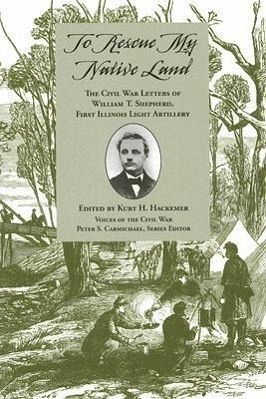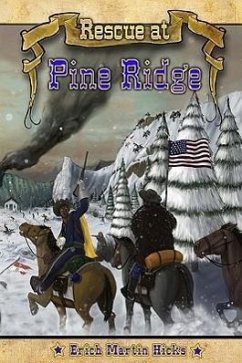
To Rescue My Native Land
The Civil War Letters of William T. Shepherd, First Illinois Light Artillery
Herausgeber: Hackemer, Kurt H; Carmichael, Peter S
Versandkostenfrei!
Versandfertig in über 4 Wochen
31,99 €
inkl. MwSt.

PAYBACK Punkte
16 °P sammeln!
The salary of a private in the army is $12, monthly and fed & uniformed. I know it is a hard life, but anything for my Native Land, wrote William T. Shepherd, a Wisconsin native enlisted in Battery B of the First Illinois Light Artillery. During his three years in the Western theater, Shepherd served as both an artilleryman and a clerk in several ordnance offices, all the while carefully recording his experiences and observations in letters to his family.A keen chronicler of camp life and the vicissitudes of soldiering, Shepherd wrote extremely detailed and enlightening battle accounts. He saw...
The salary of a private in the army is $12, monthly and fed & uniformed. I know it is a hard life, but anything for my Native Land, wrote William T. Shepherd, a Wisconsin native enlisted in Battery B of the First Illinois Light Artillery. During his three years in the Western theater, Shepherd served as both an artilleryman and a clerk in several ordnance offices, all the while carefully recording his experiences and observations in letters to his family.A keen chronicler of camp life and the vicissitudes of soldiering, Shepherd wrote extremely detailed and enlightening battle accounts. He saw significant action at Fredericktown, Belmont, Forts Henry and Donelson, and Shiloh, with his battery playing a critical role in several of these engagements. In the fall of 1862, he became an ordnance clerk. From a unique vantage point rarely known by historians, he described the logistical apparatus supporting the Union advance against Vicksburg and later across Tennessee.In his new capacity as a rear-area soldier, Shepherd had the opportunity to interact with local civilians. He regularly attended civilian churches, had black servants and housekeepers and witnessed colored balls, met Southerners on the street on a daily basis, and boarded in a Southern home. Because of these experiences, Shepherd came to view the South s citizens as more than battlefield abstractions, and his understanding of the occupied South grew increasingly nuanced.Highly educated compared with many other soldiers of his rank, Shepherd expresses the life of the common combatant in an unusually articulate way. To Rescue My Native Land traces the evolution of a young recruit to veteran artilleryman and administrative operative and provides a unique look at the behind-the-scenes operations of several of the Civil War s most important engagements."












